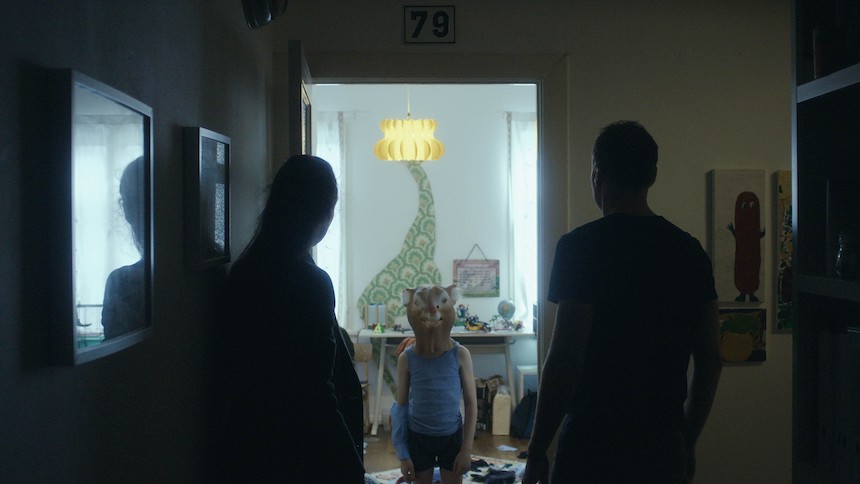Sundance 2021 Review: HUMAN FACTORS, Home Invasion Drama Illuminates a Family's Dissolution

The home invasion sub-genre, with its approximation to the real world beyond the screen and the absence of the distancing effects typical of other horror sub-genres (e.g., supernatural, slashers, undead), can be a vehicle for examining interrelated social, cultural, and political issues. This can happen either directly, or as in writer-director Ronny Trocker’s (The Eremites) second feature-length film, Human Factors, through a distinct European Art Cinema lens — a deliberate distancing effect on its own that will alienate more than a few members of an audience — that fully embraces the shifting ambiguities, solipsistic realities, and confounding contradictions inherent in modern European life. Albeit at the cost of the emotional catharsis or clarity typically associated with conventional narratives.
Human Factors centers on a superficially successful, upper-middle-class, bourgeois German-French family led by Jan (Mark Waschke) and Nina (Sabine Timoteo). Together they own an up-and-coming boutique ad agency, one where Jan handles the day-to-day business operations and Nina provides the creative ideas fundamental to the agency's success. Their partnership extends to a faltering marriage and two children, Emma (Jule Hermann), a disaffected,surly teen gradually discovering her own identity apart from her family, and Max (Wanja Valentin Kube), a shy, withdrawn preteen unhealthily obsessed with his pet rat, Zorro. A general, suffocating malaise seems to permeate their chilly, perfunctory interactions, signaling that it’ll take just one push, literal or figurative, to fracture an already disintegrating family.
After unilaterally deciding that their ad agency will handle a political campaign for a xenophobic candidate for the first time, and against Nina’s stated desire to avoid mixing politics and business (itself a political choice), causing additional friction in Jan and Nina’s personal and professional relationships, they decide to take a break and spend the weekend at the family’s vacation home on the coast of Belgium. It’s a seemingly innocuous decision that serves as a catalyst for the unwinding of Jan and Nina’s marriage that Trocker explores with near voyeuristic, uncomfortably unerring precision, dissembling an otherwise straightforward narrative into multiple points of view, one each for Jan, Nina, Emma, and Max, plus an unexpected perspective that resolves some questions about the home invasion while still leaving others permanently unanswered.
Trocker’s dissembled narrative structure intentionally invites the kind of close scrutiny that 21st-century filmmaking tends to avoid under the not-inaccurate assumption that most viewers lack the attention spans necessary to engage in or with non-linear, puzzle-solving stories. As Trocker sets and resets the central story, circling back to the beginning of the weekend, following through the home invasion only Nina witnesses directly, and its aftermath, he doesn’t leave signposts or callouts to signal the ever-shifting points of view. This creates a disorientating effect meant to mirror the subjective realities of the characters on-screen and the inability, at least in Trocker’s view, that a shared, consensus reality or understanding of the events surrounding the home invasion is all but impossible. Not because an objective reality doesn’t exist, but because the characters themselves can’t make the empathetic leap necessary to see each other’s perspectives.
As Jan, Mark Waschke exudes a cool, chilly persona not dissimilar from Michael Fassbender. Despite an obviously controlling nature, Waschke’s Jan isn’t an entirely unsympathetic figure, driven by and obsessed with social status, professional success, and the material comforts both can bring to his family. A late-film revelation, however, about Jan and his relationship with Nina’s gay brother, suggests that Jan’s unilateral decision to work on a political campaign might align with his own, unstated views. But like so much else in Human Factors, Trocker leaves that conclusion — if it’s a conclusion at all — to the audience. More than Waschke’s acting equal, Sabine Timoteo brings a shaded, subtle vulnerability to her performance as Nina, allowing the audience to see the shifting tides of Nina’s inner life in almost imperceptible changes in her facial expressions and body language.
Mel Valentin
contributed to this story.
Human Factors
Director(s)
- Ronny Trocker
Writer(s)
- Ronny Trocker
Cast
- Mark Waschke
- Hassan Akkouch
- Spencer Bogaert
- Marthe Schneider







